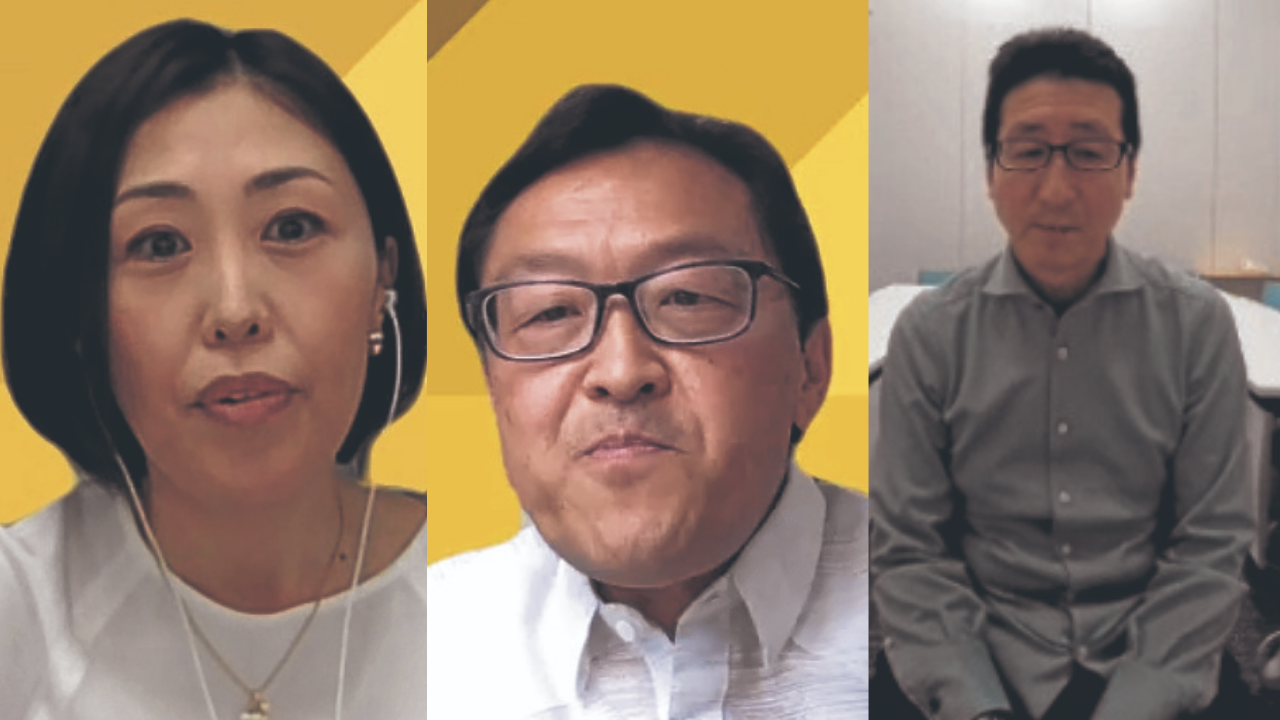
From left: Kanami Namiki (JFF assistant director and program manager), Ben Suzuki (Japan Foundation Manila directo, and Masafumi Konomi (Japan Film Festival producer)
“We aren’t Netflix. Our content is focused on films not seen in big streaming platforms,” said Ben Suzuki, director of Japan Foundation Manila (JFM), organizer of the Japanese Film Festival (JFF) 2022, which is now running virtually until Feb. 27.
“We want to be ubiquitous. We want people to reach us every time, everywhere. This a very ambitious dream, but we are slowly achieving this,” Suzuki declared during a recent virtual media gathering to announce this edition’s lineup.
Encourage discourse
The presscon was also attended by JFF producer Masafumi Konomi and JFF assistant director and program manager Kanami Namiki.
“We want to maintain a festival feel, to have a system that’s different from the subscription platforms. This is why we are hosting panel discussions, too. We want to encourage discourse among our Filipino audience,” Suzuki declared.
Featured are 20 titles, from bittersweet coming-of-age stories to thriller, sci-fi, comedy, documentaries, animation, and heartbreaking ones, Suzuki reported. In addition to the screenings, JFM is also hosting a two-part free online talk event titled “Let’s Talk about Japanese Films!” This will also be available to interested participants even outside the Philippines.
The first session, “Your Guide to Japanese Films,” featured panelists Daisuke Miyao, Nick Deocampo and film director Sigrid Andrea Bernardo. Held yesterday, it was moderated by film critic-educator Tito Valiente.
The second event, titled “Inside the World of JFF 2022 Films,” will feature five young film critics namely Skilty Labastilla, Princess Kinoc, Janus Nolasco and Stepanie Mayo; to be moderated by Richard Bolisay. It will be streamed on Feb. 22 at 5 p.m.
Asked how JFF 2022 intends to promote Japan to Filipinos in this era of virtual screenings, Suzuki said: “The festival gives viewers the chance to experience and learn Japanese ways and culture, as the featured films mirror our contemporary society and document people’s lives at certain periods in time. Films are indeed powerful vehicles for cultural exchange and bilateral relations.”
“This is actually one important consideration in our selection of films for the festival,” added Konomi. “In the lineup, there are films that will make you feel like you’re in Japan. You will see the different seasons there, just like in the films ‘It’s a Summer Film!’ and ‘Bread of Happiness.’ You will also have a ‘taste’ of what Japan has to offer in terms of culinary art.”
Konomi was referring to the period drama “Mio’s Cookbook.” Set in Japan about 200 years ago. It shows the bond between Mio, who stakes her life on cooking, and Noe, who has become a courtesan (high-class geisha) in Yoshiwara, Japan’s largest red-light district.
“We know that there are many ramen stores in the Philippines. You will be able to watch real ramen production in ‘The God of Ramen.’ Imagine the ample work put in making ramen in Japan,” Suzuki added.
“These days, Japanese films tend to focus on social issues, but not in the way of the Filipino films, in the style of the Japanese,” Suzuki told reporters. “Films like the ‘Aristocrats’ attempt to show show social disparities, which is a very serious topic in Japan.”
Other titles in the lineup are “Under the Open Sky,” “Masked Ward,” “Awake,” “Ito,” “Time of Eve the Movie,” “Patema Inverted,” “Sumodo: The Successors,” “Rashomon,” “Ozland,” “ReLIFE,” “Her Love Boils Bathwater,” “The Floating Castle,” “Until the Break of Dawn,” “The Chef of South Polar” and “Happy Flight.”
JFF is formerly known as Eigasai and was held every July in celebration of the Philippine-Japan Friendship Month.
“We had a lot of challenges last year related to the screening of films online. We want to make sure that the festival will run smoothly this year. The goal is to provide access to Japanese movies to everyone with ease. We also hope to organize physical events soon,” declared Konomi.
To watch and view the full list of featured films, visit Japanese Film Festival Online 2022.